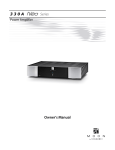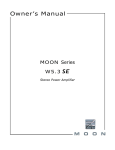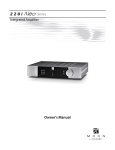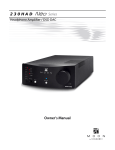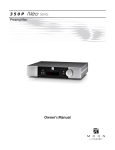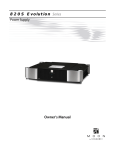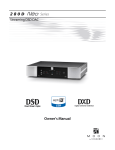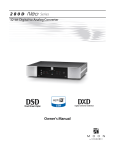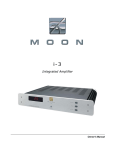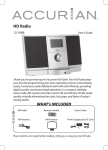Download Neo 400M Amplifier
Transcript
400M Series Mono Power Amplifier Owner’s Manual 400M Neo Series Owner’s Manual Important Safety Instructions 1. Read these instructions. 2. Keep these instructions. 3. Heed all warnings. 4. Follow all instructions. 5. Do not use this apparatus near water. 6. Clean only with a dry cloth. 7. Do not block ventilation openings. Install in accordance with the manufacturer’s instructions. 8. Do not install near any heat sources such as radiators, heat registers, stoves or another apparatus that produces heat. 9. Do not defeat the safety purpose of the polarized or grounding type plug. A polarized plug has two blades with one wider than the other. A groundingtype plug has two blades and a third grounding prong. The wide blade or the third prong is provided for safety. If the provided plug does not fit into the outlet, consult an electrician for replacement of the obsolete outlet. 10. Protect the power cord from being walked on or pinched, particularly at plugs, convenience receptacles, and the point where they exit from the apparatus. Unplug mains cord during transportation. 11. Only use attachments and accessories specified by the manufacturer. 12. Use only with the cart, stand, tripod, bracket, or table specified by the manufacturer or sold with the apparatus. When a cart is used, use caution when moving the cart/apparatus combination to avoid injury from tip over. 13. Unplug this apparatus during lightning storms or when unused for long periods of time. 14. Refer all servicing to qualified service personnel. Servicing is required when the apparatus has been damaged in any way, such as when the power cord or plug has been damaged; liquid has been spilled or objects have fallen into the apparatus; or the apparatus has been exposed to rain or moisture, does not operate normally, or has been dropped. 15. No naked flame sources, such as candles, should be placed on the apparatus. WARNING: TO REDUCE THE RISK OF FIRE OR ELECTRIC SHOCK, DO NOT EXPOSE THIS APPLIANCE TO RAIN OR MOISTURE. 400M Neo Series Important Safety Instructions (cont’d) The lightning flash with the arrowhead symbol, within an equilateral triangle, is intended to alert the user to the presence of uninsulated “dangerous voltage” within the product’s enclosure that may be of sufficient magnitude to constitute a risk of electric shock to persons. The exclamation point within an equilateral triangle is intended to alert the user to the presence of important operating and maintenance (servicing) instructions in the literature accompanying the appliance. Marking by the “CE” symbol (shown left) indicates compliance of this device with the EMC (Electromagnetic Compatibility) and LVD (Low Voltage Directive) standards of the European Community Please read all instructions and precautions carefully and completely before operating your Nēo 400M Power Amplifier. 1. ALWAYS disconnect your entire system from the AC mains before connecting or disconnecting any cables, or when cleaning any component. To completely disconnect this apparatus from the AC mains, disconnect the power supply cord plug from the AC receptacle. 2. 6. NEVER wet the inside of the Nēo 400M with any liquid. If a liquid substance does enter your Nēo 400M, immediately disconnect it from the AC mains and take it to your MOON dealer for a complete check-up. The Nēo 400M must be terminated with a three-conductor AC mains power cord which includes an earth ground connection. To prevent shock hazard, all three connections must ALWAYS be used. Connect the Nēo 400M only to an AC source of the proper voltage; Both the shipping box and rear panel serial number label will indicate the correct voltage. Use of any other voltage will likely damage the unit and void the warranty 7. NEVER spill or pour liquids directly onto the Nēo 400M. 8. NEVER block air flow through ventilation slots or heatsinks. 9. NEVER bypass any fuse. AC extension cords are NOT recommended for use with this product. The mains plug of the power supply cord shall remain readily accessible. 12. NEVER expose the Nēo 400M to extremely high or low temperatures. 4. NEVER use flammable or combustible chemicals for cleaning audio components. 14. ALWAYS keep electrical equipment out of reach of children. 5. NEVER operate the Nēo 400M with any covers removed. There are no user-serviceable parts inside. An open unit, especially if it is still connected to an AC source, presents a potentially lethal shock hazard. Refer all questions to authorized service personnel only. 15. ALWAYS unplug sensitive electronic equipment during lightning storms. 3. 10. NEVER replace any fuse with a value or type other than those specified 11. NEVER attempt to repair the Nēo 400M. If a problem occurs contact your MOON dealer. 13. NEVER operate the Nēo 400M in an explosive atmosphere. 16. WARNING: Do not expose batteries or battery pack to excessive heat such as sunshine, or fire or the like. Owner’s Manual Table of Contents Introduction Unpacking Installation & Placement Rear Panel Layout Connecting the Nēo 400M Balanced Operation Operating the Nēo 400M Remote Operation Specifications 6 7 7 8 9 9 10 11 12 www.simaudio.com Simaudio Ltd., 1345 Newton Road Boucherville, Québec J4B 5H2 CANADA Date Code: 20150805 400M Neo Series Introduction Thank you for selecting the Nēo 400M Mono Power Amplifier as a part of your hi-fi reproduction system. This power amplifier has been designed to offer stateof-the-art high-end performance in an elegant package, while retaining all the sonic hallmarks on which Simaudio has made its reputation. We have spared no effort to ensure that it is among the finest two-channel amplifiers available. We have been building highperformance audio equipment for over 30 years, and the know-how gained through our cumulative experience is an important reason why MOON amplifiers are so musically satisfying. The performance of your improve during the first 300 the result of a “break-in” numerous high quality throughout this amplifier. 400M will continue to hours of listening. This is period required for the electronic parts used Before setting up your new Nēo 400M, we encourage you to please read this manual thoroughly to properly acquaint yourself with its features. We hope you enjoy listening to the Nēo 400M Mono Power Amplifier as much as the pride we have taken in creating this fine audio product. We understand the power and emotion of music and build our products with the goal of faithfully capturing these elusive qualities. The information contained in this manual is subject to change without notice. The most current version of this manual is available on our official website at http://www.simaudio.com Your Nēo 400M Mono Power Amplifier incorporates many significant design features to achieve its “worldclass” level of performance. This is an abbreviated list of the more important features: 6 Proprietary “Advanced Rennaisance” Technology which eliminates feedback. The results are: Real-time amplification, more accurate musical reproduction and the elimination of transient intermodulation distortion. Balanced differential circuitry. Proprietary MOON Bipolar Output transistors with unprecedented gain linearity resulting in improved bass response and even more accurate sonic reproduction. Class A output to 10 watts for greater efficiency. An exceptionally short signal path for a faster transient response. A high damping factor which yields superior musical dynamics, improved signal speed and refined timbre accuracy. RS-232 port for i) full unsolicited bidirectional feedback in custom installation setups and ii) firmware updates. 12 Volt Trigger input and output. Rigid chassis construction to minimize the effects of external vibrations. Designed to be powered up at all times for optimal performance. Low operating temperature for an ultra-long life expectancy. Owner’s Manual Unpacking The Nēo 400M power amplifier should be removed from its box with care. The following accessories should be included inside the box with your amplifier: 9 AC power cable 9 This owner’s manual 9 Warranty and product registration information (USA and Canada only) Once the Nēo 400M is unpacked, inspect it thoroughly and report any damage to your dealer immediately. We suggest that you keep all of the original packaging, storing it in a safe, dry place in case you’re required to transport this product. The customized packaging is specially designed to protect the 400M from any potential damage during transit. Please write the serial number of your new Nēo 400M in the space provided below for future reference. Serial Number Installation & Placement The Nēo 400M Mono Power Amplifier requires reasonable ventilation to maintain an optimum and consistent operating temperature, especially since it will radiate heat when driven hard. Consequently, it should be placed in a location with empty space around it for proper heat dissipation. You should never place another component on top of this integrated amplifier. As well, it should be placed on a solid level surface. You should avoid placing it near a heat source or inside a closed cabinet that is not well ventilated as this could compromise the amplifier’s performance and reliability. The 400M uses a large toroidal transformer in its power supply; even though it is well shielded, you should not place this power amplifier too close to source components sensitive to EMI, such as turntables, phono preamplifiers and CD Players. Finally, you should never place another component directly on top of this power amplifier. 7 400M Neo Series Rear Panel Layout Figure 1: Nēo 400M Rear panel The rear panel will look similar to Figure 1 (above). There is one balanced (differential) input on an XLR connector and one unbalanced (single-ended) input on a RCA connector. There is no switch to toggle from balanced mode to single-ended mode. You may operate the amplifier in either mode, but only one mode at one time When you’re using the balanced XLR inputs, you must first remove the factory installed “dummy” XLR jumpers (see figure 2 below) from the back panel XLR connectors and store them in a safe place. This jumper is required ONLY when using the single-ended RCA input. When you decide to switch to single-ended input mode, you must reinstall the XLR jumper (between pins 1 and 3) exactly as shown below: The left side of the rear panel has a pair of 12 Volt triggers, each on a 1/8” mini-jack; one input and one output, the latter for use if you need to “daisy chain” a second power amplifier on the same trigger circuit. Immediately to the right of these 12V triggers is an RS232 input on a DB9 connector. In the middle of the rear panel you will find a pair of heavy duty gold-plated speaker binding posts. On the far right side, you will find (from top to bottom); The power “main switch”; The “AC Fuse” socket cover and the “AC in” IEC receptacle for the power cord. Figure 2: XLR connector without and with jumper accessory 8 Owner’s Manual Connecting the 400M Prior to making any connections or removing the XLR jumpers, the power amplifier must be turned off and the AC cable disconnected for at least 1 minute. 1. Connect the input cables running from your preamplifier’s outputs, whether balanced or singleended, to the amplifier’ s XLR or RCA input, respectively. We highly recommend that you use the balanced XLR input (provided that your preamplifier has balanced outputs) to take full advantage of Nēo 400M Mono Power Amplifier’s capabilities. Please refer to the next section, “Balanced Operation” on for further information. Do not connect cables to both the XLR and RCA inputs at the same time. Damage to both the 400M and the connected equipment can result that is not covered by warranty. . Don’t hesitate to use high quality interconnect cables*. Poor quality interconnect cables can degrade the overall sonic performance of your system. It is recommended, though not mandatory, to use balanced interconnects between your preamplifier and the 400M when using long cable runs (i.e. more than 3 meters in length). 2. Connect your speaker, with the cable of your choice, to the 400M’s speaker binding posts. Take care to respect the polarity (“+” , “-” ) of the outputs. Once again, don’t hesitate to use high quality speaker cables*. Poor quality speaker cables can degrade the overall sonic performance of your system. 3. Connect the supplied AC power cable to the IEC receptacle, located on the amplifier’s rear panel. Ensure that the AC wall outlet you use has a functioning ground. For the best sonic performance, it is preferable that you plug your 400M directly into a dedicated AC outlet and avoid using an extension cord. If you have the time and willingness, consider installing a superior quality AC wall outlet such as a hospital grade Hubbell*. * Please speak with your MOON Authorized Retailer about the benefits of high quality cables for your system, and superior quality AC wall outlet.. Balanced Operation When using an unbalanced interconnect, the audio signal runs through both the center wire and the shield/ground wire. Any noise picked up by this interconnect (ie. nearby magnetic fields such as an AC power cord) will be reproduced by the amplifier and heard through the loudspeakers. Conversely, a balanced interconnect has three separate conductors; one for the ground and two for the actual signal. These two signals are identical except that one is 180 degrees out of phase with the other. For example, when one conductor is carrying a signal of +5 Volts, the other will be carrying a signal of –5 Volts. When these two inverted signals on a balanced line are input into a differential power amplifier such as the Nēo 400M, any noise picked up by the interconnect will be eliminated since a differential circuit amplifies only the difference between these two signals: Noise on a balanced interconnect will be equal on both conductors and therefore cancel out. 9 400M Neo Series Operating the 400M We recommend leaving your Nēo 400M powered up at all times to maintain optimal performance. When you plan on being away for a few days, it may not be a bad idea to power off your amplifier. Please keep in mind that once fully “broken-in”, your 400M requires several hours of operation before reaching optimal performance after powering it up again. Turning on your Nēo 400M for the first time Prior to turning the amplifier on for the first time, make sure that every cable is properly connected to avoid any problems. Then turn on your preamplifier connected to the 400M. Flick the main rocker switch, located on the rear panel, labeled “POWER” to the ‘1’ (on) position. The blue LED on the front panel will blink for up to 10 seconds while it achieves standby mode. When it stops blinking and is not illuminated, your 400M is in standby mode. Next, briefly press the push button labeled “Standby” located on the front panel. You will hear a very faint click sound confirming that everything is in order. The blue LED on the front panel will illuminate, indicating that the 400M is now powered up and ready for use. On and Off Sequence To avoid having any annoying noises (ie. “thumps” and “pops”) emanate from your speakers when powering 10 your 400M on or off, you should always power up your preamplifier prior to powering up your 400M. As well, always power down your 400M prior to powering down your preamplifier. Troubleshooting Your Nēo 400M Mono Power Amplifier is equipped with a self-diagnostic system that will automatically shut itself down when it detects either DC (direct current) or it enters into thermal protection mode due to overheating. When either of these situations occur, the blue LED on the front panel will begin to blink continuously. If your 400M power amplifier turns itself off or will not power up, there may very well be some DC present in the amplifier’s input coming from your preamplifier’s outputs. To determine if there is any DC present power down your 400M via the main power rocker switch, then disconnecting the input to the 400M leaving only the speaker connected. Attempt to power up your 400M again: A successful power up will indicate the presence of DC coming from your preamplifier or one of your signal sources (ie. CD Player). When your amplifier has overheated, simply wait until it cools down before attempting to power it back on again. If your 400M still doesn’t power up, turn off the main power switch and check the AC fuse. If the fuse appears OK, put it back in its socket and then try powering up again. If the fuse is blown, replace it with a fuse of the same rating, and repeat the above process. At this point, you should be able to power up your 400M. If not, immediately consult your Authorized MOON Retailer for assistance. Owner’s Manual Remote Operation Figure 3: Remote Operation In figure 3 we have a Nēo 350P Preamplifier and a pair of 400M Amplifiers connected together via their respective 12V triggers; The 12V trigger output on the 350P is connected to the 12V trigger input on the top 400M (using a 1/8” mini-jack cable). The 12V trigger output from this 400M connects to the 12V trigger input on the bottom 400M (also using a 1/8” mini-jack cable). When you turn on the 350P using a remote control (or its Standby button), both 400M’s will turn on automatically. The same rule applies when you put the 350P into Standby mode. 11 400M Neo Series Specifications Configuration Fully Balanced Differential, Mono Power Supply Transformer 400VA Power Supply Capacitance 85,000μF Class Of Operation A/AB Input Impedance 47,500Ω Input Sensitivity 800mV Output Device Type MOON Bipolars Output Power @ 8Ω 400 Watts Output Power @ 4Ω 650 Watts Frequency Response 10Hz – 125kHz +0/-3.0dB Gain 36dB Signal-to-noise Ratio 106dB @ full power Intermodulation Distortion 0.02% Total Harmonic Distorition (20Hz-20kHz @ 1W) 0.02% Total Harmonic Distorition (20Hz-20kHz @ 125W) 0.05% Power Consumption @ idle 36 Watts AC Power Requirements 120V / 60Hz or 240V / 50Hz Shipping Weight 33 lb. / 15 Kg. Dimensions (W x H x D, inches / cm.) 16.9 x 3.5 x 14.0 / 42.9 x 8.9 x 35.6 Balanced Pin Assignment: Pin 1 Pin 2 Pin 3 Ground Positive Negative NOTE: If you require the RS-232 codes for your Nēo 400M, please visit the "Contact Us" page and complete the "Information request" form on our website at www.simaudio.com. Fuse Replacement: 12 120V version uses a 8A fast blow (3AG) 230V version uses a 4A fast blow (3AG)












